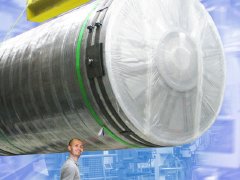The cylinder is made entirely of a doped molybdenum material. This advanced material enables the furnace of this press to operate at temperatures of 1,350 degrees Celsius and a pressure of 1,180 bar. The HIP press is due to start operation in Japan by 2010.
 HIP cylinder, manufactured by PLANSEE, for the world’s largest hot isostatic press.
HIP cylinder, manufactured by PLANSEE, for the world’s largest hot isostatic press.
The cylinder that PLANSEE manufactured for the press is about 5 metres long and measures more than 2.2 metres in diameter. It required about 40,000 rivets to assemble. Ulf Odebo, business unit director isostatic presses at Avure Technologies, comments: “Constructing such a huge HIP press was a step into uncharted territory. The doped molybdenum cylinder, which is the innermost part of a complex heater/thermal barrier assembly, is a key element of the press, and it was therefore vital that we chose a manufacturer who we could completely trust – and who had consistently proved themselves to be a reliable partner through years of working together successfully.”
Wolfgang Köck, managing director production at PLANSEE, says: “Manufacturing the HIP molybdenum cylinder was a real challenge. This major step forward in furnace design required us to draw on all our experience of engineering and construction, as well as our expertise in manufacturing and processing refractory metals. A key factor for the high quality of the finished product is the fact that we were able to handle and thus control the entire manufacturing process, from the powder through to the finished molybdenum cylinder.”
Manufacturing this cylinder required the use of PLANSEE’s full range of refractory metals processing technologies: laser and water-jet cutting, tooling, hot working such as spinning, bending and rolling as well as joining using doped molybdenum rivets and flame spraying.